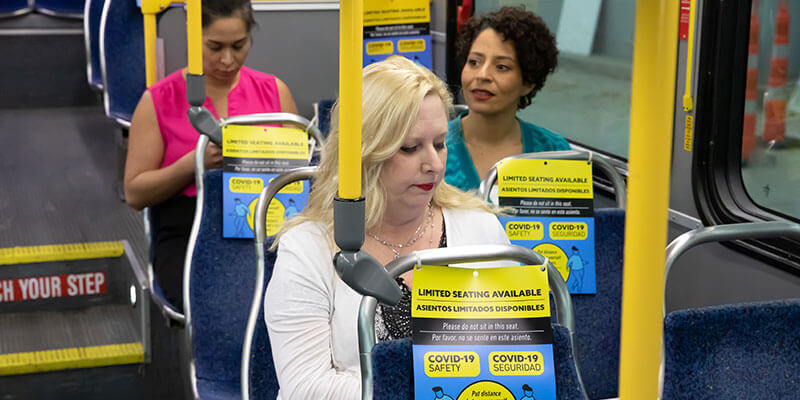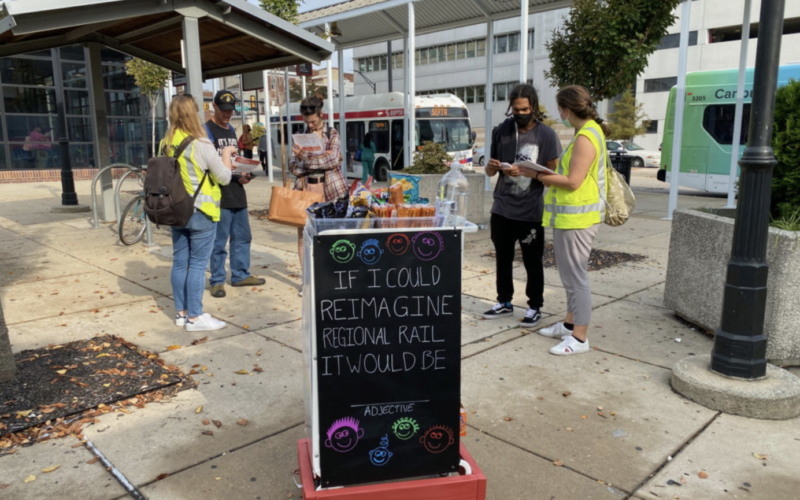
Photo via Houston METRO
The COVID-19 pandemic presents a sudden, severe threat for transit agencies across the country. During this crisis, TransitCenter will be shifting our focus to the specific challenges posed by the virus.
As a private foundation, TransitCenter cannot advocate for specific legislation to address the shortfalls agencies will soon face as ridership and dedicated tax revenue decline. What we will do is raise awareness of the new problems agencies are dealing with and share best practices to help agencies learn from one another.
We’re starting with a look at how agencies are responding to the immediate public health risk.
In response to COVID-19, transit agencies have dramatically stepped up cleaning and disinfecting procedures, installed hand sanitizer in stations, and developed new ways to limit customer touchpoints on trains and buses. But even with optimal cleaning operations, transit agencies still face the question of how to continue to safely provide service to the public.
Transit service in this moment must fulfill a dual role: providing mobility for medical workers and hospital support staff, food distribution and grocery employees, government employees, and other essential workers; and preventing crowding that risks exacerbating spread of the virus. Many agencies are making smart decisions now that will enhance the safety of riders and the transit workforce while getting people where they need to go.
It’s important to note that this mandate is critical to the health and wellbeing of the general public while putting strains on agency budgets that are impossible to maintain given current revenue streams. Agencies are going to need emergency funding assistance to continue running service and keep the safety measures described below in place.
Strategically reorienting service
In order to lessen crowding throughout its system, Houston Metro is putting more buses into service on heavily traveled local routes. It is also encouraging social distancing by using paper signs to indicate that 50% of the seats on buses and light rail are now considered to be “out of service.”
Notable: as of now, @METROHouston is actually adding some service on busy routes due to Coronavirus to give passengers more space to spread apart, while putting signs on seats to put 50% off limits. https://t.co/qUJtSLrmMP pic.twitter.com/iW4wfzWvq8
— Christof Spieler (@christofspieler) March 17, 2020
In San Francisco, where Mayor London Breed has ordered residents to “shelter in place,” SFTMA is scaling back service on routes that primarily serve tourists in order to focus on core service needs. By eliminating service on the cable and streetcars, SFMTA has more flexibility to re-allocate service to neighborhood routes that reach critical services like hospitals.
Protecting transit operators
To minimize contact between agency personnel and passengers, several agencies are suspending fare enforcement efforts and implementing rear door boarding on buses.
In Seattle, both King County Metro and Sound Transit are suspending fare enforcement. Enforcement officers will still be stationed across the system to answer questions and to remind riders they are still expected to pay their fares.
In Maryland, MTA is instructing customers to enter through the rear door to minimize contact. In San Francisco, SFMTA has publicly committed to ensuring physical partitions between operators and riders.
Communicating with riders
A pressing issue for transit agencies is how to respond to the question of whether it’s safe to ride. In San Francisco, BART has been crystal clear with its customers about who should ride and who should not. Through a consistent stream of tweets, BART has stressed that it will continue to provide regular service, while helping to define what essential travel means, and urging sick passengers to avoid the system. The agency has also been communicating regularly about the damage ridership drops have inflicted on its financial outlook, helping to build early public support for the need for emergency funding.
BART is running regular service during the shelter in place order to provide mobility for essential workers including first responders, health care providers, grocery store clerks, news media and more. We have long trains for social distancing.
Don’t ride if you are sick.— SFBART (@SFBART) March 17, 2020
We will continue to explore topics related to the COVID-19 crisis, including the best ways to keep transit workers safe, in the weeks ahead. If there are specific issues you’d like to see us address email your ideas to Hayley at [email protected]
 New TransitCenter Report: To Solve Workforce Challenges Once and For All, Transit Agencies Must Put People First
New TransitCenter Report: To Solve Workforce Challenges Once and For All, Transit Agencies Must Put People First
TransitCenter’s new report, “People First” examines the current challenges facing public sector human resources that limit hiring and retention, and outlines potential solutions to rethink this critical agency function.
Read More A Transit Revolution in Philadelphia?
A Transit Revolution in Philadelphia?
The Southeastern Pennsylvania Transportation Authority (SEPTA) has been working throughout the pandemic on several system-wide planning initiatives that have the potential to transform transit service in and around the city of Philadelphia.
Read More